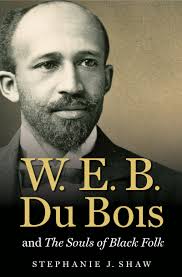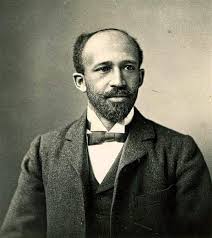The Souls of Black Folk Page #3
The Souls of Black Folk is a 1903 work of American literature by W. E. B. Du Bois. It is a seminal work in the history of sociology and a cornerstone of African-American literature. The book contains several essays on race, some of which the magazine Atlantic Monthly had previously published.
A people thus handicapped ought not to be asked to race with the world, but rather allowed to give all its time and thought to its own social problems. But alas! while sociologists gleefully count his bastards and his prostitutes, the very soul of the toiling, sweating black man is darkened by the shadow of a vast despair. Men call the shadow prejudice, and learnedly explain it as the natural defence of culture against barbarism, learning against ignorance, purity against crime, the “higher” against the “lower” races. To which the Negro cries Amen! and swears that to so much of this strange prejudice as is founded on just homage to civilization, culture, righteousness, and progress, he humbly bows and meekly does obeisance. But before that nameless prejudice that leaps beyond all this he stands helpless, dismayed, and well-nigh speechless; before that personal disrespect and mockery, the ridicule and systematic humiliation, the distortion of fact and wanton license of fancy, the cynical ignoring of the better and the boisterous welcoming of the worse, the all-pervading desire to inculcate disdain for everything black, from Toussaint to the devil,—before this there rises a sickening despair that would disarm and discourage any nation save that black host to whom “discouragement” is an unwritten word. But the facing of so vast a prejudice could not but bring the inevitable self-questioning, self-disparagement, and lowering of ideals which ever accompany repression and breed in an atmosphere of contempt and hate. Whisperings and portents came home upon the four winds: Lo! we are diseased and dying, cried the dark hosts; we cannot write, our voting is vain; what need of education, since we must always cook and serve? And the Nation echoed and enforced this self-criticism, saying: Be content to be servants, and nothing more; what need of higher culture for half-men? Away with the black man’s ballot, by force or fraud,—and behold the suicide of a race! Nevertheless, out of the evil came something of good,—the more careful adjustment of education to real life, the clearer perception of the Negroes’ social responsibilities, and the sobering realization of the meaning of progress. So dawned the time of Sturm und Drang: storm and stress to-day rocks our little boat on the mad waters of the world-sea; there is within and without the sound of conflict, the burning of body and rending of soul; inspiration strives with doubt, and faith with vain questionings. The bright ideals of the past,—physical freedom, political power, the training of brains and the training of hands,—all these in turn have waxed and waned, until even the last grows dim and overcast. Are they all wrong,—all false? No, not that, but each alone was over-simple and incomplete,—the dreams of a credulous race-childhood, or the fond imaginings of the other world which does not know and does not want to know our power. To be really true, all these ideals must be melted and welded into one. The training of the schools we need to-day more than ever,—the training of deft hands, quick eyes and ears, and above all the broader, deeper, higher culture of gifted minds and pure hearts. The power of the ballot we need in sheer self-defence,—else what shall save us from a second slavery? Freedom, too, the long-sought, we still seek,—the freedom of life and limb, the freedom to work and think, the freedom to love and aspire. Work, culture, liberty,—all these we need, not singly but together, not successively but together, each growing and aiding each, and all striving toward that vaster ideal that swims before the Negro people, the ideal of human brotherhood, gained through the unifying ideal of Race; the ideal of fostering and developing the traits and talents of the Negro, not in opposition to or contempt for other races, but rather in large conformity to the greater ideals of the American Republic, in order that some day on American soil two world-races may give each to each those characteristics both so sadly lack. We the darker ones come even now not altogether empty-handed: there are to-day no truer exponents of the pure human spirit of the Declaration of Independence than the American Negroes; there is no true American music but the wild sweet melodies of the Negro slave; the American fairy tales and folklore are Indian and African; and, all in all, we black men seem the sole oasis of simple faith and reverence in a dusty desert of dollars and smartness. Will America be poorer if she replace her brutal dyspeptic blundering with light-hearted but determined Negro humility? or her coarse and cruel wit with loving jovial good-humor? or her vulgar music with the soul of the Sorrow Songs? Merely a concrete test of the underlying principles of the great republic is the Negro Problem, and the spiritual striving of the freedmen’s sons is the travail of souls whose burden is almost beyond the measure of their strength, but who bear it in the name of an historic race, in the name of this the land of their fathers’ fathers, and in the name of human opportunity. And now what I have briefly sketched in large outline let me on coming pages tell again in many ways, with loving emphasis and deeper detail, that men may listen to the striving in the souls of black folk. II. Of the Dawn of Freedom Careless seems the great Avenger; History’s lessons but record One death-grapple in the darkness ’Twixt old systems and the Word; Truth forever on the scaffold, Wrong forever on the throne; Yet that scaffold sways the future, And behind the dim unknown Standeth God within the shadow Keeping watch above His own. LOWELL. The problem of the twentieth century is the problem of the color-line,—the relation of the darker to the lighter races of men in Asia and Africa, in America and the islands of the sea. It was a phase of this problem that caused the Civil War; and however much they who marched South and North in 1861 may have fixed on the technical points, of union and local autonomy as a shibboleth, all nevertheless knew, as we know, that the question of Negro slavery was the real cause of the conflict. Curious it was, too, how this deeper question ever forced itself to the surface despite effort and disclaimer. No sooner had Northern armies touched Southern soil than this old question, newly guised, sprang from the earth,—What shall be done with Negroes? Peremptory military commands this way and that, could not answer the query; the Emancipation Proclamation seemed but to broaden and intensify the difficulties; and the War Amendments made the Negro problems of to-day.
Translation
Translate and read this book in other languages:
Select another language:
- - Select -
- 简体中文 (Chinese - Simplified)
- 繁體中文 (Chinese - Traditional)
- Español (Spanish)
- Esperanto (Esperanto)
- 日本語 (Japanese)
- Português (Portuguese)
- Deutsch (German)
- العربية (Arabic)
- Français (French)
- Русский (Russian)
- ಕನ್ನಡ (Kannada)
- 한국어 (Korean)
- עברית (Hebrew)
- Gaeilge (Irish)
- Українська (Ukrainian)
- اردو (Urdu)
- Magyar (Hungarian)
- मानक हिन्दी (Hindi)
- Indonesia (Indonesian)
- Italiano (Italian)
- தமிழ் (Tamil)
- Türkçe (Turkish)
- తెలుగు (Telugu)
- ภาษาไทย (Thai)
- Tiếng Việt (Vietnamese)
- Čeština (Czech)
- Polski (Polish)
- Bahasa Indonesia (Indonesian)
- Românește (Romanian)
- Nederlands (Dutch)
- Ελληνικά (Greek)
- Latinum (Latin)
- Svenska (Swedish)
- Dansk (Danish)
- Suomi (Finnish)
- فارسی (Persian)
- ייִדיש (Yiddish)
- հայերեն (Armenian)
- Norsk (Norwegian)
- English (English)
Citation
Use the citation below to add this book to your bibliography:
Style:MLAChicagoAPA
"The Souls of Black Folk Books." Literature.com. STANDS4 LLC, 2025. Web. 22 Feb. 2025. <https://www.literature.com/book/the_souls_of_black_folk_310>.








Discuss this The Souls of Black Folk book with the community:
Report Comment
We're doing our best to make sure our content is useful, accurate and safe.
If by any chance you spot an inappropriate comment while navigating through our website please use this form to let us know, and we'll take care of it shortly.
Attachment
You need to be logged in to favorite.
Log In